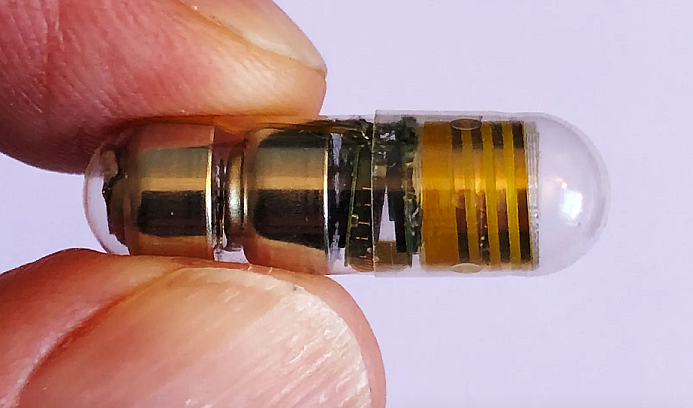New Ingestible Electronic Device May Help Detect Breathing Issues
MEDICAL MINUTES
January 9, 2024 at 5:26 p.m.
Ingestible device, about the size of a multivitamin, can help detect sleep apnea, photo courtesy Celero Systems
...by JOHN SCHIESZER
The capsule, which is about the size of a multivitamin, uses an accelerometer to measure the patient's breathing rate and heart rate. In addition to diagnosing sleep apnea, the device could also be useful for detecting opioid overdoses in individuals at high risk.
"It's an exciting intervention to help people be diagnosed and then receive the appropriate treatment if they suffer from obstructive sleep apnea," said Giovanni Traverso, an Associate Professor of mechanical engineering at MIT and a gastroenterologist at Brigham and Women's Hospital in Boston, Massachusetts. "The device also has the potential for early detection of changes in respiratory status, whether it's a result of opiates or other conditions that could be monitored, like asthma or chronic obstructive pulmonary disease (COPD)."
In a study with 10 volunteers, the researchers showed that the capsule can be used to monitor vital signs and to detect sleep apnea episodes, which occur when the patient repeatedly stops and starts breathing during sleep. The patients did not show any adverse effects from the capsule, which passed harmlessly through the digestive tract.
Over the past decade, the research team has developed a range of ingestible sensors that could be used to monitor vital signs and diagnose disorders of the GI tract, such as gastrointestinal slowdown and inflammatory bowel diseases. This new study focused on measuring vital signs, using a capsule that included an accelerometer. It detects slight movements generated by the beating of the heart and the expansion of the lungs. The capsule also contains two small batteries and a wireless antenna that transmit data to an external device such as a laptop.
"What we were able to show is that using the capsule, we could capture data that matched what the traditional transdermal sensors would capture," Traverso says. "We also observed that the capsule could detect apnea, and that was confirmed with standard monitoring systems that are available in the sleep lab."
None of the patients reported any discomfort or harm from the capsule. Radiographic imaging performed 14 days after the capsules were ingested revealed that all of them had passed through the patients' bodies. The research team's previous work has shown that objects of similar size usually move through the digestive tract in a little more than a day.
The researchers envision that this kind of sensor could be used to diagnose sleep apnea in a less intrusive way than the skin-based sensors that are now used. It could also be used to monitor patients when they begin treatment for apnea to make sure that the treatments are effective.
John Schieszer is an award-winning national journalist and radio and podcast broadcaster of The Medical Minute. He can be reached at medicalminutes@gmail.com.





